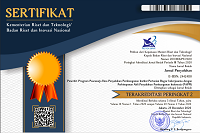Analisis LKM Posdaya Kenanga Terhadap Tingkat Pendapatan Pelaku Usaha Mikro di Kelurahan Situ Gede
Abstract
LKM is a financial institution that serves to distribute micro-credit to the poor or low-income community. The granted micro-creditis expected to help the community, especially micro entrepreneurs to be able to expand their business. Business development is astrategic step to increase micro entrepreneur revenue. However, LKM should consider about the level of target accuracy, resourceprovivion, and movement development. This research aimed to analyze the implementation of LKM Posdaya Kenanga to microentrepreneur income level in Situ Gede Village. The research methods were The Rank Spearman Test and Cross Tabulationwhich were used to determine the existence of relationship between the implementation of LKM to micro entrepreneur incomelevel. The results showed that the implementation of LKM Posdaya Kenanga did not have positive and significant relationshipto micro entrepreneur level because the amount of micro entrepreneur income was generally low.
Keywords: micro credit, micro entrepreneurs, micro enterprises development
Downloads
Authors who publish with this journal agree to the following terms:
- Authors retain copyright and grant the journal right of first publication with the work simultaneously licensed under a

This work is licensed under a Creative Commons Attribution 4.0 International License that allows others to share the work with an acknowledgement of the work's authorship and initial publication in this journal. - Authors are able to enter into separate, additional contractual arrangements for the non-exclusive distribution of the journal's published version of the work (e.g., post it to an institutional repository or publish it in a book), with an acknowledgement of its initial publication in this journal.
- Authors are permitted and encouraged to post their work online (e.g., in institutional repositories or on their website) prior to and during the submission process, as it can lead to productive exchanges, as well as earlier and greater citation of published work (See The Effect of Open Access).















